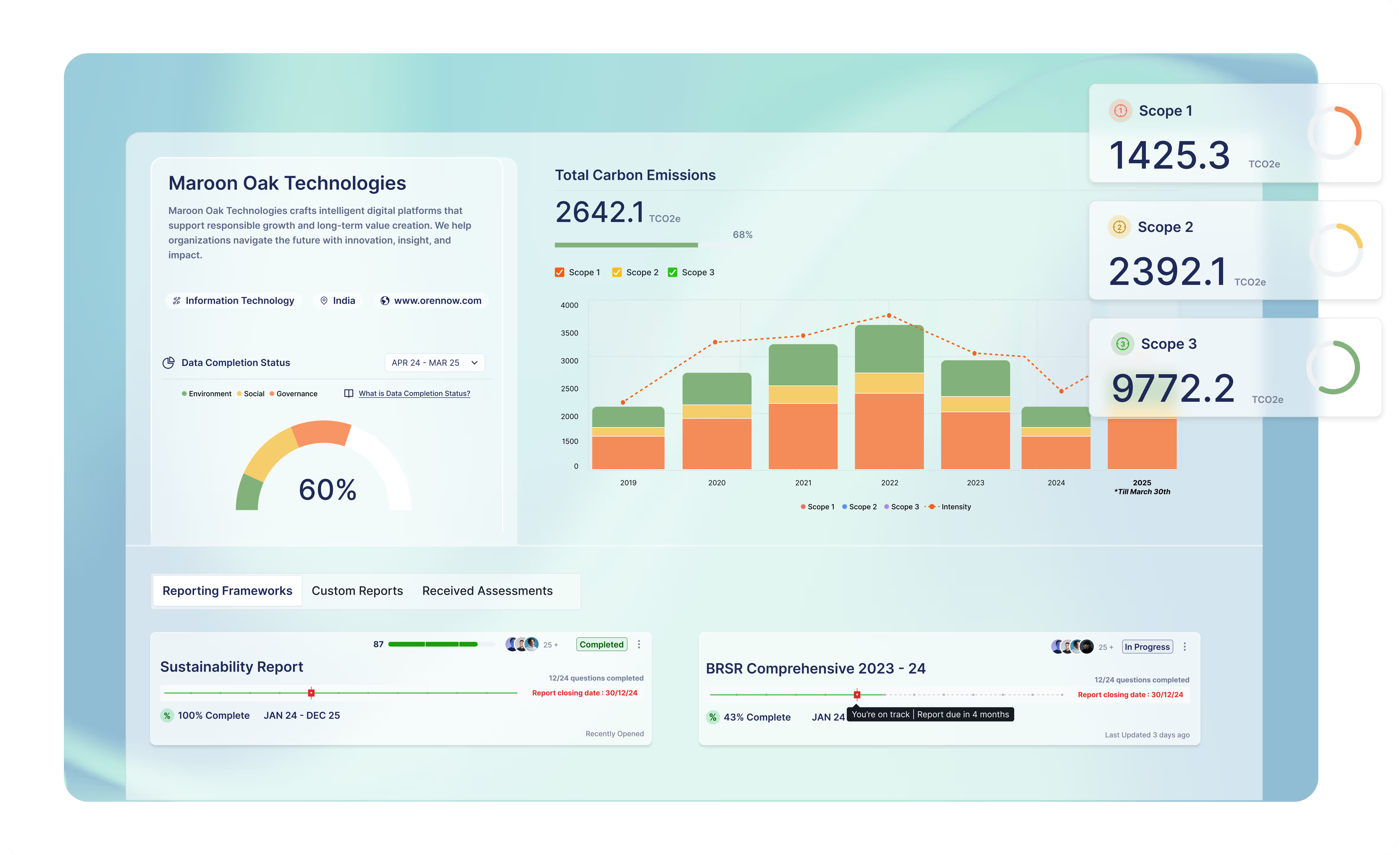Achieving Net-Zero Emissions in the Pharmaceutical Sector: A Comprehensive Guide

Introduction: The Urgent Need for Net-Zero Emissions in Pharma
The pharmaceutical sector plays an essential role in global healthcare, yet it also significantly contributes to greenhouse gas emissions. As the world strives toward net-zero emissions, the pharmaceutical industry faces unique challenges. This article delves into the key hurdles and solutions for achieving net-zero emissions within the pharmaceutical sector, emphasising the importance of sustainability reporting in India and global trends in environmental sustainability.
Key Challenges in Achieving Net-Zero Emissions
1. High Energy Consumption and the Need for Energy Efficiency
The pharmaceutical industry's high energy consumption stems from energy-intensive processes in manufacturing and research activities. This not only increases operational costs but also significantly contributes to greenhouse gas emissions, challenging the industry's ability to achieve net-zero emissions. To address this, pharmaceutical companies must adopt energy-efficient measures. Conducting energy audits, upgrading facilities with advanced HVAC systems, and promoting behavioural changes among employees can optimise energy use, thereby reducing both costs and environmental impact.
2. Fossil Fuel Reliance: A Major Barrier to Decarbonisation
The pharmaceutical sector's reliance on fossil fuels for energy generation is a significant contributor to its carbon footprint. Transitioning to renewable energy sources like solar or wind power is critical for reducing this dependency. Investing in on-site renewable energy generation and collaborating with utility providers to access renewable energy grids are vital steps for decarbonising the industry. Furthermore, understanding the differences between being carbon neutral vs net zero can guide companies in setting more effective sustainability goals.
3. Transportation Emissions and the Green Supply Chain
Transportation of raw materials, finished products, and medical supplies within the pharmaceutical supply chain adds to the sector's overall emissions. Long-distance shipping, often powered by fossil fuels, further exacerbates this issue. To mitigate transportation emissions, companies should consider optimising logistics routes, using more fuel-efficient vehicles, and exploring alternative transportation modes such as electric or hybrid vehicles. Implementing a green supply chain approach, which includes collaborating with suppliers to reduce emissions, is another essential strategy for achieving net-zero emissions.
4. Supply Chain Complexity: The Need for Sustainable Collaboration
The pharmaceutical supply chain is intricate, involving numerous stakeholders, including suppliers, manufacturers, distributors, and healthcare providers. This complexity makes it challenging to implement sustainable practices throughout the value chain. Collaboration and engagement with suppliers and partners are crucial for driving sustainable changes. Establishing clear sustainability criteria for suppliers, conducting regular audits, and promoting transparency can help create a more sustainable pharmaceutical supply chain. This approach aligns with global sustainability reporting standards like GRI guidelines and the GRESB framework.
5. Regulatory Constraints and the Push for Supportive Policies
The pharmaceutical industry operates within a strict regulatory framework, often prioritising safety and efficacy over environmental sustainability. However, there is a growing need to integrate environmental considerations into regulatory practices. Balancing compliance with sustainability goals requires collaboration between the industry and regulators. Promoting the development of supportive policies, providing incentives for sustainable practices, and fostering dialogue between regulatory bodies and pharmaceutical companies are essential to overcoming these constraints and promoting sustainable transformation within the sector. The integration of frameworks such as the TCFD certification and NGRBC guidelines can help streamline this process.

Effective Solutions for Achieving Net-Zero Emissions
1. Energy Efficiency: Optimising Operations
Energy efficiency is a critical strategy for reducing emissions in the pharmaceutical sector. Companies can start by conducting comprehensive energy audits to identify areas for improvement. Implementing energy-efficient technologies, such as LED lighting, advanced HVAC systems, and intelligent process controls, can significantly optimise energy consumption. Furthermore, promoting behavioural changes and engaging employees in energy-saving practices can enhance energy efficiency, leading to a reduced carbon footprint.
2. Adopting a Green Supply Chain for Sustainable Operations
A green supply chain approach involves collaborating with suppliers to implement sustainable practices. Pharmaceutical companies can prioritise the use of environmentally friendly packaging materials, reduce packaging waste, and encourage suppliers to lower their emissions. Implementing green procurement policies that consider sustainability criteria, conducting supplier assessments, and fostering partnerships with sustainability-committed suppliers are key steps toward achieving a greener supply chain. This aligns with global ESG reporting standards and can positively impact a company's ESG score and overall environmental sustainability.
3. Carbon Offsetting: A Crucial Component of Sustainability
For unavoidable emissions, carbon offsetting plays a vital role in the pharmaceutical sector's journey toward net-zero emissions. Companies can invest in carbon sequestration projects such as reforestation, afforestation, or wetland restoration. Supporting renewable energy projects, including wind farms or solar installations, also contributes to offsetting carbon emissions. To ensure the effectiveness and integrity of these initiatives, companies should adopt transparent and verified offsetting mechanisms, in line with the GHG protocol and global carbon accounting practices.
4. Research and Development: Driving Innovation for Sustainability
Investing in research and development is essential for driving innovation and developing greener solutions within the pharmaceutical sector. Research efforts should focus on cleaner manufacturing processes, alternative raw materials with lower environmental impacts, and environmentally friendly technologies like continuous manufacturing or green chemistry. Collaborative research partnerships, funding incentives, and knowledge-sharing platforms are crucial for facilitating the development and adoption of sustainable technologies. This approach not only enhances a company's ESG rating but also aligns with global sustainability goals, such as the 17 Sustainable Development Goals (SDGs).
Conclusion: The Path Forward for the Pharmaceutical Sector
Incorporating these practices can lead to numerous benefits, including increased brand reputation, operational efficiency, reduced energy costs, access to green financing, improved stakeholder relationships, and the potential to attract environmentally conscious consumers and investors. Several leading pharmaceutical companies, such as AstraZeneca, GSK, Merck KGaA, Novo Nordisk, Roche, Samsung Biologics, and Sanofi, have already set ambitious goals to achieve net-zero emissions. These industry leaders are setting a precedent for the entire sector, demonstrating that it is possible to achieve climate change mitigation while maintaining operational excellence.
The pharmaceutical industry has a critical responsibility to address its environmental impact and contribute to global sustainability goals. By overcoming the challenges and implementing the solutions outlined above, the sector can make significant strides toward achieving net-zero emissions, thereby ensuring a healthier planet for future generations.

-p-1080.avif)



